Key takeaways:
- Researching customs regulations in advance helps avoid complications and stress at the border.
- Being honest and transparent when declaring items can lead to a smoother customs process.
- Patience and respect towards customs officers can enhance interactions and reduce anxiety.
- Staying informed about specific customs restrictions can prevent unexpected issues during travel.
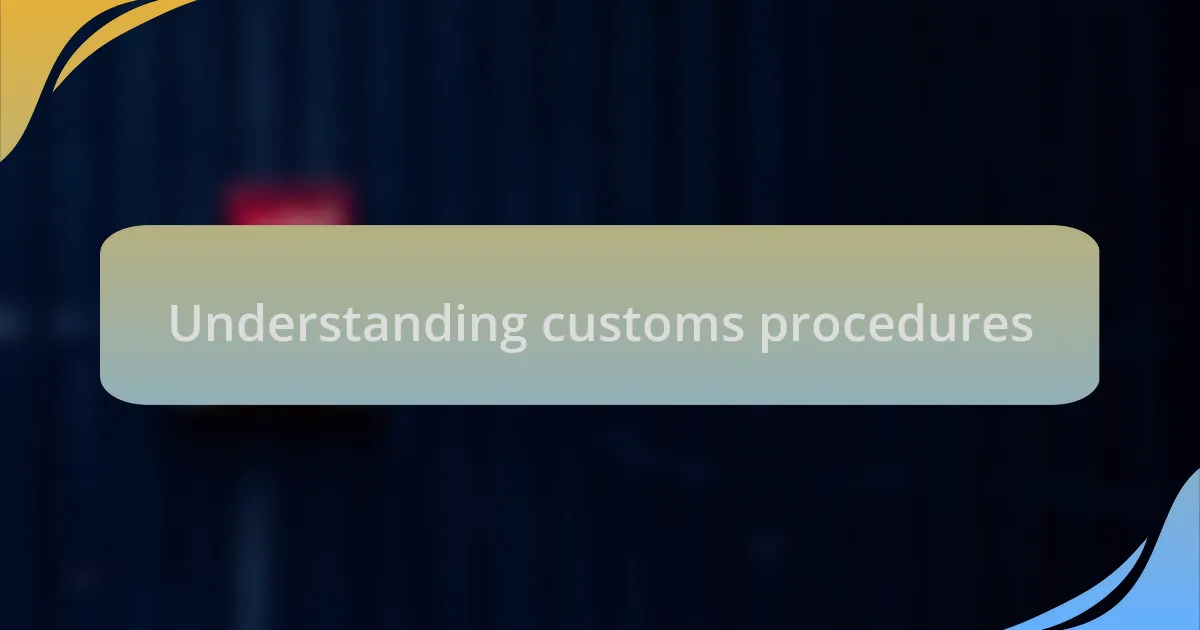
Understanding customs procedures
Navigating customs procedures can often feel daunting. I remember the first time I traveled internationally, standing in line for what felt like hours, wondering if my belongings would pass inspection. The anticipation was palpable—would the customs officer question my purchases or let me through without a hitch?
One aspect that struck me is how crucial it is to understand what can and cannot be brought across borders. I learned this the hard way when I inadvertently packed items that were restricted, leading to an unexpected interrogation. Have you ever experienced that sinking feeling when you realize you’ve made a mistake? It’s a vivid reminder of why preparation is key when dealing with customs.
Every country has its own set of customs laws, and I found that researching these in advance made all the difference. I remember pouring over various websites, jotting down notes on duty-free allowances and prohibited items. It was an enlightening experience, highlighting the importance of being informed to avoid complications and stress at the border. Have you ever taken the time to research customs regulations before a trip? If not, I highly recommend it; it can save you time and headaches later on.
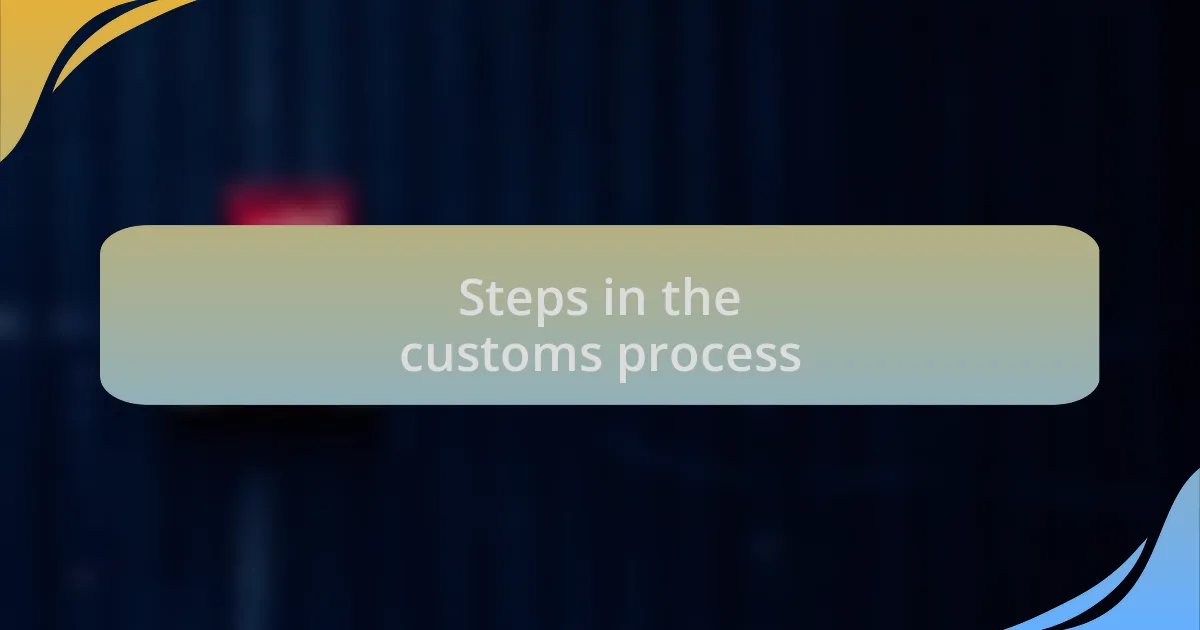
Steps in the customs process
Understanding the steps in the customs process is essential for smooth travel. For instance, after arriving, I always approach the customs line with a mix of excitement and anxiety. I remember my heart racing as I stood there, mentally rehearsing what I would say to the officer, hoping they wouldn’t ask me too many questions about my luggage.
The first step involves declaring any items I’m bringing into the country. I vividly recall a time when I declared a vintage watch I bought abroad. The officer took a moment to inspect it, and I felt a wave of nervousness—would this simple purchase be seen as suspicious? This experience taught me that being transparent is crucial; it often leads to a quicker process. Have you ever had to declare items, and how did you feel during that moment of truth?
Next comes the inspection of your bags. I once watched as a fellow traveler’s suitcase was randomly selected for a thorough check. I couldn’t help but feel a sense of unease for them. This step demonstrates how customs officers are tasked with enforcing laws while also managing the flow of travel. It reinforces the idea that preparation doesn’t stop after declaring items; it continues with knowing what to expect during inspection. Have you ever thought about how having your bags thoroughly checked would impact your perceptions of customs?
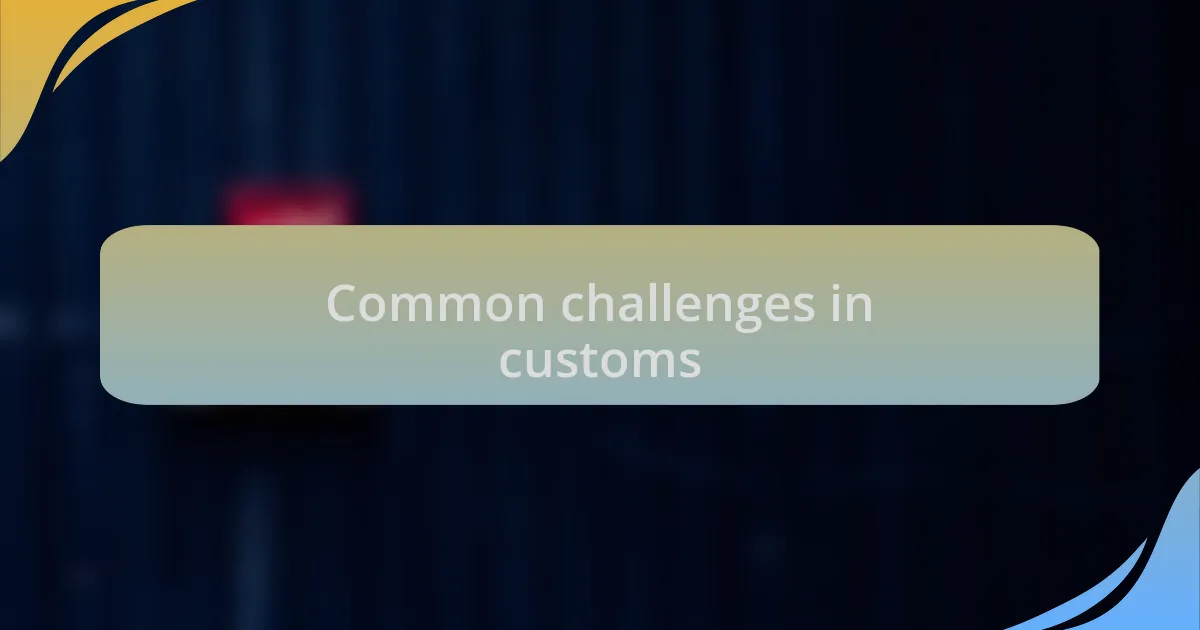
Common challenges in customs
Customs often presents unexpected hurdles that can cause anxiety for travelers. I recall a time when I miscalculated the value of souvenirs I brought back from a trip, leading to a lengthy discussion with a customs officer. It made me realize that misunderstanding regulations can turn what should be a straightforward process into a stressful experience. Have you ever felt uncertain about the rules, only to find out it complicated your journey?
Another challenge that frequently arises is the language barrier. I remember a moment when I was stuck in a customs line, and a fellow traveler struggled to communicate their declaration due to limited English. This situation served as a reminder of how critical clear communication is in customs procedures. It made me think: how often do we take for granted our ability to express ourselves, especially in high-stress environments?
Delays at customs can also become a source of frustration, particularly during peak travel seasons. There was one occasion when I waited for over an hour, watching the clock as my connecting flight time dwindled. Such experiences taught me the importance of planning for unexpected waits. Have you ever found yourself rushing through customs, praying for a miracle?
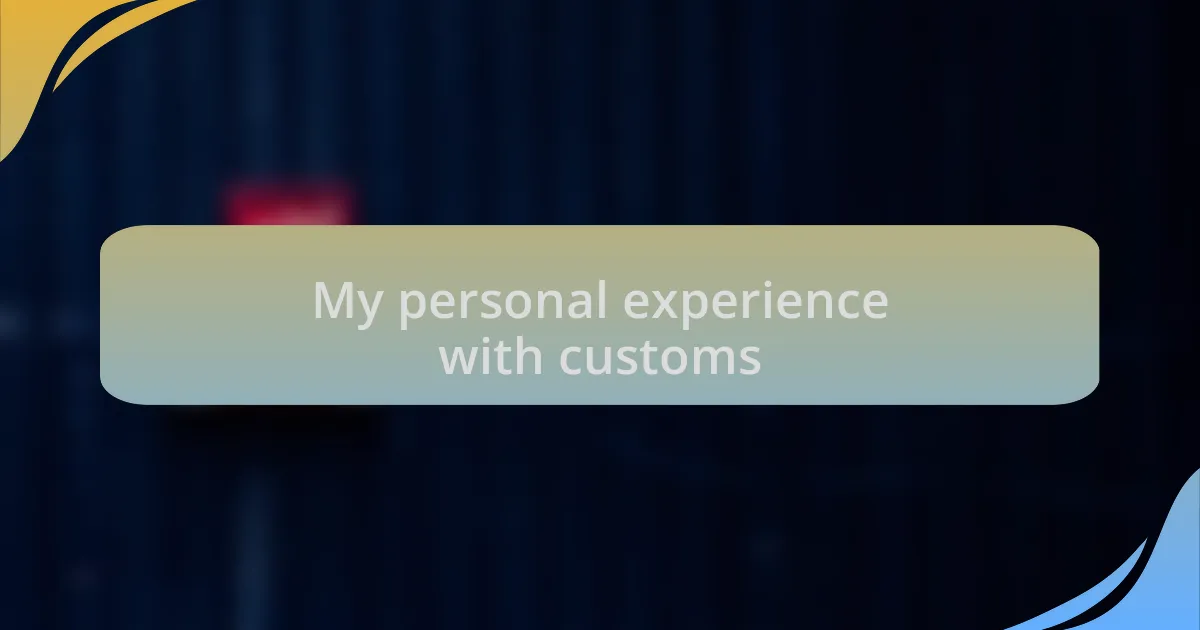
My personal experience with customs
Navigating customs can feel like walking a tightrope, especially when you’re unsure of the rules. I distinctly remember a time when I was returning from a vacation and got flagged for having an item I hadn’t declared—a charm that held sentimental value. The mixture of embarrassment and frustration I felt was palpable as I realized how easily a simple error could lead to a headache.
Then there was an experience where the customs line stretched endlessly ahead of me. I stood there, feeling a mix of impatience and doubt. I wondered if my bags would make it through without any issues. It was in that moment of waiting that I learned the importance of patience and staying calm, even when everything around me felt chaotic.
On another occasion, I had all my documents in order, but customs still held me up for additional questioning. I felt a wave of anxiety washing over me; what if something went wrong? It turned out they just needed clarification on a few details about my trip. This incident highlighted the unpredictability of customs and made me realize that sometimes, we just have to go with the flow and trust the process. Have you ever found yourself in a similar situation where the unexpected became a lesson in resilience?
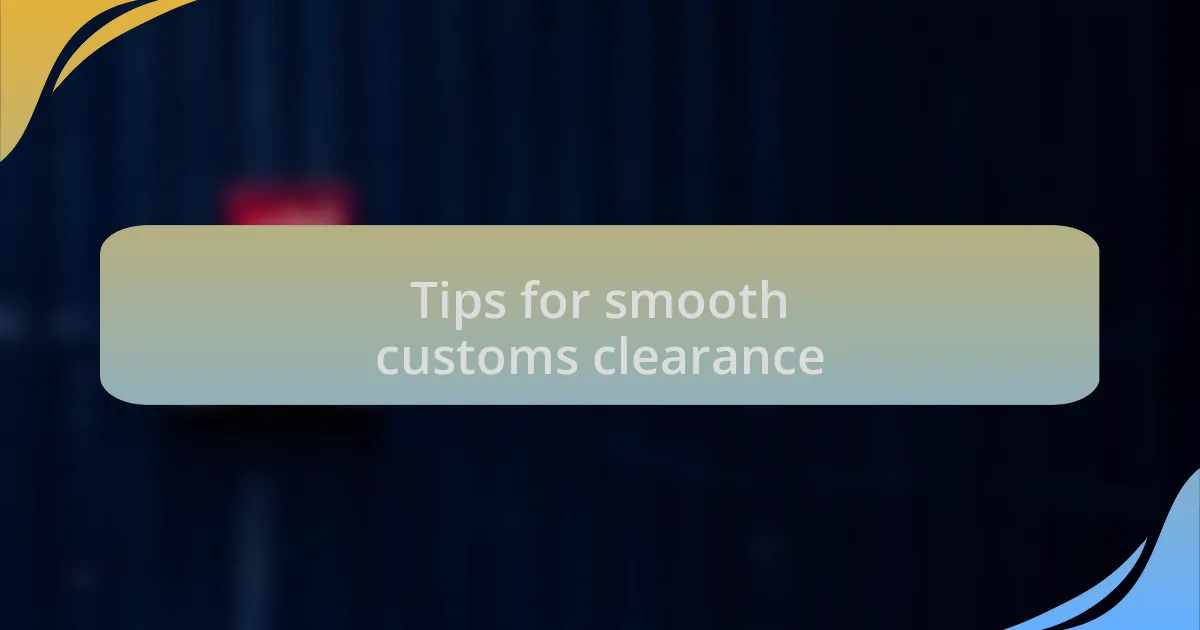
Tips for smooth customs clearance
When preparing for customs clearance, make sure to organize your documents ahead of time. I recall a particularly tense moment when I fumbled through my backpack, trying to locate my passport while the customs officer impatiently tapped his pen. Having everything accessible can significantly reduce stress and speed up the process; trust me, it’s worth taking a few extra minutes to double-check.
Additionally, be honest and thorough when declaring items. There was an instance where I hesitated to declare a gift I brought back. The tension in the air was almost tangible as I weighed my options. Ultimately, I decided to declare it, which not only eased my mind but also made the experience much smoother. Have you ever faced a similar choice, wondering whether to take the risk?
Lastly, don’t hesitate to ask questions if you’re unsure about something. During one trip, I felt overwhelmed by the various regulations and turned to a nearby customs agent for clarification. To my relief, he was friendly and provided detailed information that made the entire process easier. Seeking help is not just smart; it’s essential in navigating the complexities of customs clearance.
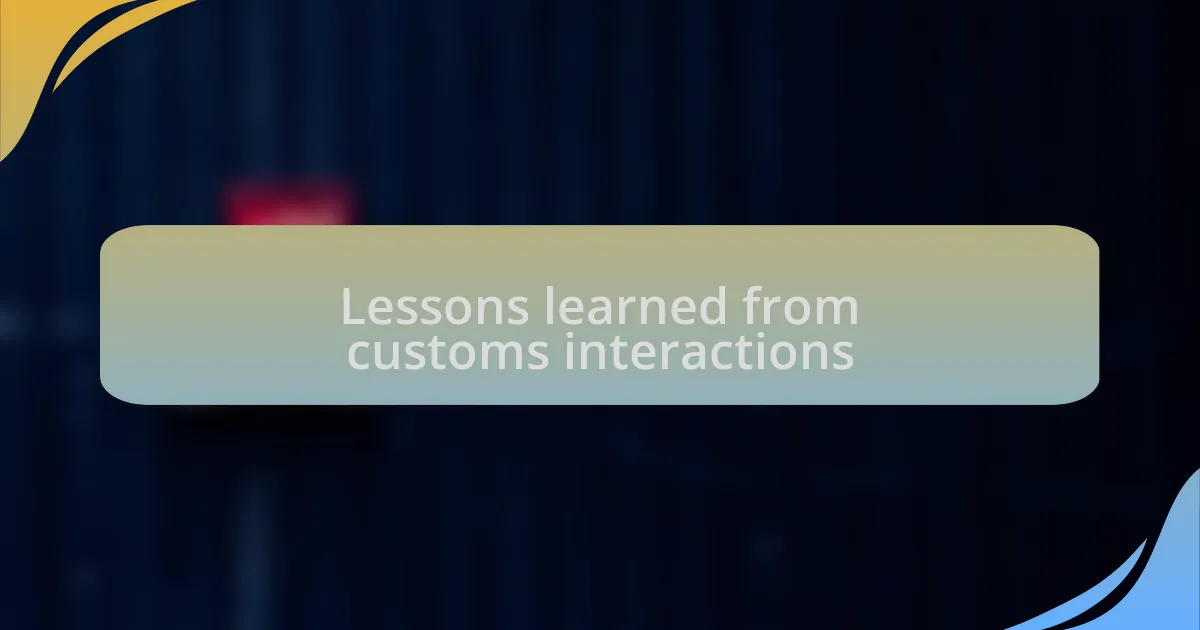
Lessons learned from customs interactions
One valuable lesson I learned from my customs interactions is the importance of patience. I remember waiting in line, feeling the pressure building as I observed other travelers breezing through with ease. The longer I waited, the more my anxiety grew, but eventually, I realized that the process requires time. Taking a deep breath and reminding myself to be patient helped me approach the customs officer with a clearer mindset.
Another insight that struck me was the significance of mutual respect. During one encounter, I recognized that treating the customs agents with courtesy transformed the interaction. When I engaged with a friendly greeting and a smile, the atmosphere shifted. Have you ever noticed how a simple “thank you” can lighten a stressful moment? It certainly made my experience smoother, making me realize that a little kindness goes a long way amid tense situations.
Finally, I learned to stay informed about customs regulations ahead of my travels. On one occasion, I was caught off-guard by specific import restrictions for certain foods I packed. The realization hit hard when I had to dispose of my carefully curated snacks right in front of the customs agent. This experience taught me that a quick review of the requirements can save you time and frustration at the border. How often do we assume we know everything, only to be surprised instead? It’s a reminder that staying updated is essential in our increasingly globalized world.